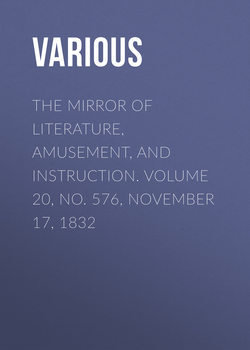Читать книгу The Mirror of Literature, Amusement, and Instruction. Volume 20, No. 576, November 17, 1832 - Various - Страница 3
WINGFIELD MANOR-HOUSE
ETHELBERT AND ELFRIDA. AN HISTORICAL TALE
ОглавлениеNight wanes apace!—The crowd are gone;
The lamps have ceased to glow;
And Cynthia's beams reflect upon
The placid lake below.
The song of mirth is heard no more;
No guests the goblet fill;
The banquet's revelry is o'er,
All—all is hush'd and still.
No more, amid the stately pile,
The dance afford's delight;
Nor tale, nor jocund sports beguile
The silent hours of night.
All seek the downy couch of sleep—
The host, and worthy guest;
The drowsy guards on duty keep,
And envy them their rest.
No minstrels strike th' enliv'ning string—
None blow the twanging horn;
The nightingale has ceas'd to sing,
And slowly breaks the morn.
The portals of the dappled East
Assume their bright array;
The Sun, in new-born splendour drest,
Drives sable clouds away.
Thick vapours from the earth arise,
And pass away unseen,
Till night again shall veil the skies,
Now lucid and serene.
Above proud Offa's gate the gold
Embroider'd banners hung—
And 'scutcheon'd shields emblazon'd told
From whence his race had sprung!
The glitt'ring lance and crested plume
Adorn the sculptur'd wall,
And deep'ning shadows cast a gloom
Around his spacious hall!
On "South Town's" "heav'n directed" fanes
Sol sheds his glowing ray;
And Peace, and Joy, through Mercia's plains
Their gladsome sceptre sway.
How diff'rent far the scene will be
When night appears again;—
O'er all now reigns festivity,
But lamentation then!
A richly silver-braided vest
The virgin train prepare—
A scarf, to wrap the snow-white breast,
And gems to deck the hair.
Elfrida, at her lattice high,
Sits with the bridal throng—
She looks and looks—then heaves a sigh—
"Why tarries he so long?"
He comes!—'tis he!—and by his side
Attend a noble band—
He comes to claim his royal bride—
His lov'd Elfrida's hand.
The wish'd-for hour is gone and past;—
Slow chimes the marriage-bell;
May Heav'n forbid it prove his last—
The bridegroom's fun'ral knell!
The priest before the altar stands—
The bride bends on her knee,
And lifts to God her heart and hands
In pious fervency!
But where is he, who should have knelt
Before his Maker, low?
And where are they, who might have felt
What none but parents know!
In vain she waits, and looks around,
Still vainer are her cries;
With shrieks the sacred aisles resound;—
Save echo, naught replies:
Fell grief her throbbing heart enthrals,—
Her lips grow ghastly pale;
She weeps—she faints—and senseless falls
Before the altar-rail!
But where is he, by whom the vows
Of love were pledg'd so late?
Demand of Offa's artful spouse,
Whose fiat seal'd his fate?
The blush of guilt upon her cheek
Spreads forth its purple hues,—
And agitation seems to speak
What conscience dares refuse!
To Him who gives life's fleeting breath
His soul has ta'en its flight!—
He sleeps the last long sleep of death
Upon his bridal night.
His guards were gone;—no friends were near
To bless him ere he died!
None, none to dry the falling tear,
Or bid his pains subside.
Oh! where is she whom fate hath made
Dejected and forlorn?
She goes to Croyland's hallow'd shade,
To live—alas!—to mourn!
Weep, Anglia, weep!—thy monarch's dead!
To heav'n his spirit's flown;
And he whose hands his blood have shed
Will mount thy vacant throne.
He reigns!—but mark! how self-reproach
Pervades his inmost breast;—
And pangs of sad remorse encroach
Upon his fever'd rest.
He lives—but life has little left,
If aught, his love to claim;
Of all, save grief, 'tis now bereft;
To him 'tis but a name!
J.H.I.
The event which the foregoing stanzas have attempted to describe laid the foundation of the future importance and prosperity of the Cathedral church of Hereford.
"The restless ambition of Offa prompted him to attack the neighbouring kingdom of the East Angles, with a view of adding it to his dominions; but in this attempt he was defeated by the successful valour of Ethelbert. Peace being subsequently concluded, Offa acceded to proposals of marriage between Ethelbert and his daughter Elfrida;—and the young and unsuspecting prince attended, invited, at the palace of Offa (at South Town, now Sutton, near Hereford), with a splendid retinue, to treat of the intended spousals. The queen of Offa, Quendreda, is recorded to have prevailed upon her husband to violate the ties of hospitality and humanity; and Ethelbert was treacherously murdered, A.D. 793. His guards and retinue were dispersed; his kingdom, taken by surprise, was annexed to the state of Mercia. The faithful Elfrida retired to Croyland Abbey; and Offa, seized with remorse, sought to appease his wounded conscience by actions which, at that time, were thought to atone for the deepest delinquency. He caused the body of Ethelbert to be removed from Marden, where it had been previously interred, to the cathedral of St. Mary, at Hereford, erecting over him a magnificent tomb, and endowing the church with valuable gifts, chiefly situated in the immediate vicinity of his own palace. The known virtues of the murdered prince caused his shrine to be visited as that of a martyr; and such was the fame of his miracles, that the city and cathedral attained a degree of opulence from the pious contributions of devoted pilgrims."
Wright's History of Hereford.
It is not asserted that Ethelbert was murdered on the day appointed for his marriage; but poetical license will, it is hoped, be pardoned for the variation, whilst the principal facts are strictly adhered to.
